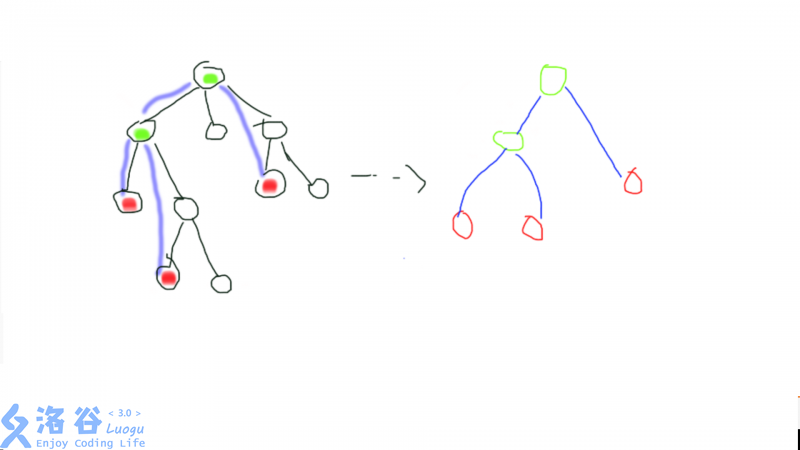1
2
3
4
5
6
7
8
9
10
11
12
13
14
15
16
17
18
19
20
21
22
23
24
25
26
27
28
29
30
31
32
33
34
35
36
37
38
39
40
41
42
43
44
45
46
47
48
49
50
51
52
53
54
55
56
57
58
59
60
61
62
63
64
65
66
67
68
69
70
71
72
73
74
75
76
77
78
79
80
81
82
83
84
85
86
87
88
89
90
91
92
| #include <cstdio>
#include <cctype>
#include <cstring>
#include <algorithm>
using namespace std;
template<typename T>inline void read(T &x) {}
template<typename TT> inline void print(TT x, char end = '\n') {}
typedef long long LL;
const int N = 25e4 + 9;
struct Edge {
int nxt, to, val;
};
int n, m, cnt_e, dfu;
int head[N], pu[N], po[N], fa[N][20], deep[N], mn[N], a[N<<1], stk[N];
LL f[N];
bool vis[N];
Edge e[N<<1];
inline void add_edge(int u, int v, int w) {
e[++cnt_e] = (Edge){head[u], v, w}, head[u] = cnt_e;
}
void dfs(int u, int last) {
pu[u] = ++dfu;
deep[u] = deep[last] + 1;
fa[u][0] = last;
for (int i = 1; 1 << i <= deep[u]; ++i)
fa[u][i] = fa[fa[u][i-1]][i-1];
for (int i = head[u], v; i; i = e[i].nxt)
if ((v = e[i].to) != last) {
mn[v] = min(mn[u], e[i].val);
dfs(v, u);
}
po[u] = ++dfu;
}
int LCA(int x, int y) {
if (deep[x] < deep[y]) swap(x, y);
for (int i = 19; ~i; --i)
if (deep[fa[x][i]] >= deep[y])
x = fa[x][i];
for (int i = 19; ~i; --i)
if (fa[x][i] != fa[y][i])
x = fa[x][i], y = fa[y][i];
return x == y ? x : fa[x][0];
}
inline bool cmp(int x, int y) {
return (x > 0 ? pu[x] : po[-x]) < (y > 0 ? pu[y] : po[-y]);
}
int main() {
read(n);
for (int i = 1, u, v, w; i < n; ++i)
read(u), read(v), read(w), add_edge(u, v, w), add_edge(v, u, w);
mn[1] = 0x7fffffff;
dfs(1, 0);
read(m);
int k, tot, top;
while (m--) {
tot = top = 0;
read(k);
for (int i = 1; i <= k; ++i)
read(a[++tot]), vis[a[tot]] = true, f[a[tot]] = mn[a[tot]];
sort(a+1, a+k+1, cmp);
for (int i = 1, lca; i < k; ++i){
lca = LCA(a[i], a[i+1]);
if (!vis[lca]) a[++tot] = lca, vis[lca] = true;
}
if (!vis[1]) a[++tot] = 1;
k = tot;
for (int i = 1; i <= k; ++i)
a[++tot] = -a[i];
sort(a+1, a+tot+1, cmp);
for (int i = 1, u; i <= tot; ++i) {
if (a[i] > 0) stk[++top] = a[i];
else {
u = stk[top--];
if (u != 1)
f[stk[top]] += min(f[u], (LL)mn[u]);
else print(f[u]);
f[u] = vis[u] = 0;
}
}
}
return 0;
}
|
